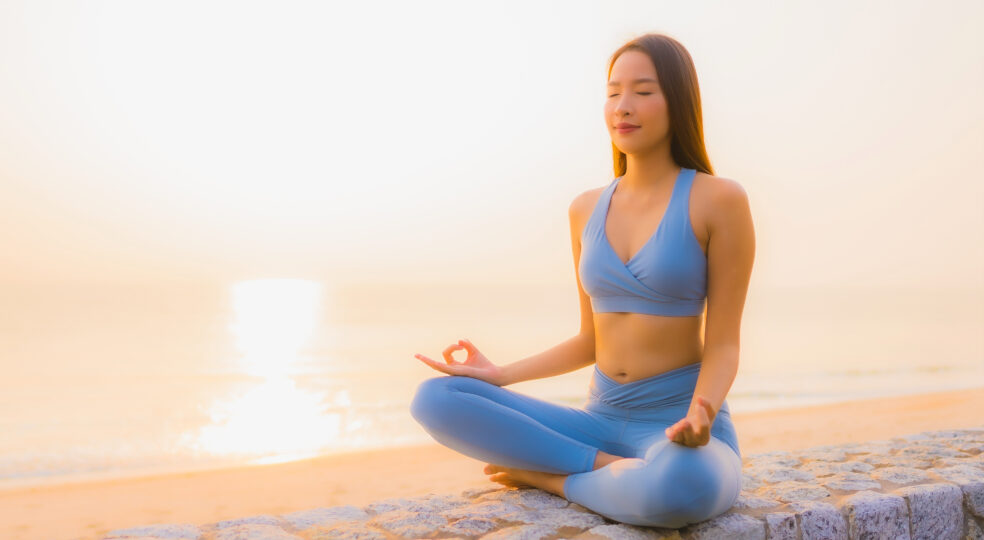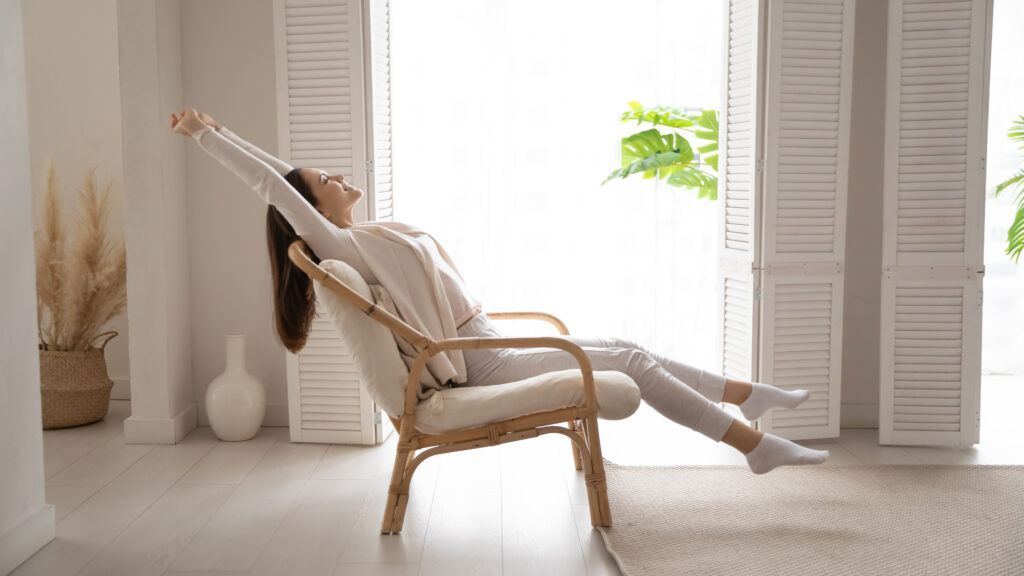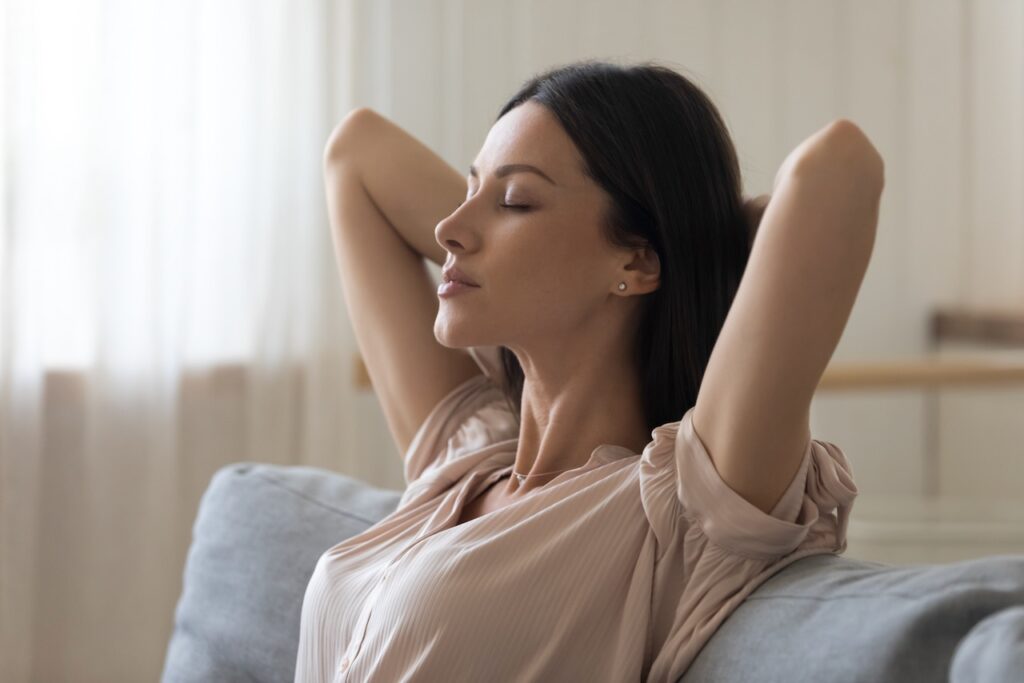
There's always something going on at work and at home. To keep your stress level from rising too high, you need breaks. However, rest and relaxation alone are not enough to really come down. Targeted relaxation techniques are needed. With breathing exercises, Meditation and other techniques, you gradually reduce stress hormones and recharge your batteries. These light activities - physical and/or mental - release your tension. Afterwards you feel much fitter than if you just lay on the couch and doze off.
Relaxation techniques are special methods that reduce your internal and external tension. Basically, stress is not a bad thing: it is a natural reaction to risky situations. From one moment to the next, the body mobilizes all its forces to fight or flee. This was vital, at least in the early days of mankind. Responsible for this are the stress hormones, which are still with us today.
Physical activity quickly reduces adrenaline, dopamine and cortisol. But in this day and age, we don't need to run, fight or chase. Without physical activity, stress remains in the body and triggers symptoms such as tension and palpitations.
To avoid this, there are various relaxation techniques. There is no protection against the stress triggers, but the techniques help you to lower the stress level. This reduces the risk of stress-related illnesses.
Physical and mental relaxation techniques serve to harmonize body and soul. Sometimes a walk is enough to make you feel calm again. Many people can completely switch off while reading or listening to music and relax. Besides these passive methods, there are active relaxation techniques that will improve your well-being.
Typical relaxation techniques are meditation, yoga and autogenous training. Compared to the passive methods, the active techniques strengthen your resilience. The relaxing effect lasts significantly longer. You'll also learn how to manage stress more easily in the future.
The techniques for relaxation have a systematic and targeted effect on the organism. There are extensive scientific research results on the various methods, which prove their efficiency. Especially the active relaxation techniques increase your well-being and resilience.
The calming effect is directly related to physical relaxation. In addition, there is an improved body awareness. This helps you not to get nervous in stressful phases. You gradually learn to reduce excitement through small relaxation exercises. This makes you more resilient to stressors.
If you practice your relaxation techniques regularly, you will gradually become more relaxed. Previous psychosomatic problems such as headaches or circulatory problems will decrease. Overall you feel happier and less vulnerable. Even in an acute stress situation, you can keep a clear head - because some relaxation exercises are suitable as immediate help.

Think about which relaxation technique suits you best - or try all techniques. This will help you find the right method to combat stress. Among other things, your decision will depend on what you are fighting against. For example, relaxation techniques for anxiety or stress have a different goal than relaxation techniques for anxiety.
2. progressive muscle relaxation
The idea of Progressive Muscle Relaxation or muscle relaxation comes from the US-American Edmund Jacobson (1885 to 1976). He recognized that muscles tense up under stress. Through targeted tensing and subsequent relaxation, these tensions loosen up again. The alternation of tension and relaxation also increases blood circulation, so that you feel pleasantly warm.
Muscle relaxation helps not only as a relaxation technique for stress. At Anxiety and pain disorders, it also reduces symptoms. Sleep disorders and nervousness can also be alleviated by progressive muscle relaxation. Courses in the Jacobson method are available from doctors and physiotherapists. Some health insurance companies and clinics also offer an introductory course in this easy-to-learn relaxation technique.
You can consciously control certain physical activities.
3. autogenic training
In autogenic training the Autosuggestion plays a major role. Because something happens here that seems impossible: just by your will you influence your breathing, your heartbeat and even your perception. In principle, the autonomic nervous system has control over these functions. But the way via the control of the brain works: You can consciously control certain physical activities.
The idea came from the psychologist Johannes Heinrich Schultz, who developed it in the 1930s. He came up with the idea that nerve impulses can influence muscles. Physical actions such as breathing and digestion run at a more relaxed pace when controlled by the brain. But you need a lot of practice - and a good coach - before you can achieve this.
Even simple autogenic training makes you stronger and more resistant to stress. In a professional course, you'll learn how to take command of your body. Your right arm is getting heavy ... the Solar system becomes warm ... and you feel relaxed and comfortable.
4. Meditation and Mindfulness
The meditation includes various concentration and Mindfulness exercises. Numerous variants can be found under their generic term. The goal of meditative exercises is to gain distance from the outside world. In meditation you forget your many everyday worries and fears. You escape from external stimuli. Your attention is completely focused on a particular object - or on your breath, or on a piece of music.
5. Respiratory Therapy
You breathe all the time - so you can always and everywhere perform breathing exercises for relaxation. This means that the various breathing techniques are also suitable for an emergency, for example in a stressful situation or a Panic attack. Body and mind are closely connected. When you're nervous, you breathe shallowly and quickly. But with steady, slowed breathing, you calm yourself. So conscious, deep breathing has a relaxing effect on your body.
Counting to 4 on each inhale and exhale - or 4-7 breathing: count to 4 on the inhale and 7 on the exhale - will bring you to calm. Just breathing consciously helps you to collect yourself. You're directing your thoughts away from your worries and toward yourself: almost like a little meditation. If you breathe out longer than you breathe in, the relaxation effect increases even more. This is because your breath deepens with each breath, because the body needs more oxygen after the long exhalation - and you automatically inhale even more deeply.
The many errands in everyday life hardly let you breathe. This leads to complaints such as tension and sleep disorders. But with effective relaxation techniques you can reduce stress and feel better. It is important that you do the exercises regularly. The more they become second nature to you, the more relaxed you will become. This makes you strong for new challenges. Stress strains the body and also the psyche. You need a certain amount of rest to get rid of the stress hormones. Otherwise it will be difficult for you to relax properly.
The relaxation techniques bring many benefits:
So it's worth learning physical and mental relaxation techniques: the effect is scientifically proven. Physical methods such as the isometric relaxation technique (increased muscle tension to increase strength) simultaneously show a positive effect on deep muscles and body awareness. Yoga and Pilates are also about connecting body and mind: You gain more balance, are more balanced.

Tai-chi, yoga or autogenic training are best taught in a group class. But some techniques you can learn on your own. With a quiet place in your home and some initial guidance, your first relaxation exercises can begin.
It is important that no one disturbs you during the exercises. If necessary, hang a sign on the door or let them know that you need a few minutes of quiet.
After a hard day, you feel tense and have a headache. The guided evening meditation for relaxation invites you to relax and forget the stress of everyday life. With soft relaxation music in the background, accompanied by a soothing voice, you will come to rest. The meditation exercise lasts only nine minutes and gives you a feeling of peace and silence. Afterwards you feel deeply relaxed and ready for the next activities.
You want to actively fight stress? Good idea, because with it you strengthen your mental and physical health. The Greator Meditations Challenge puts you on the right track. With these relaxation exercises you will find your inner center and become more satisfied.
The challenge with five short meditations help you in five days to more Serenity. The inner center, your inner child and the connectedness of the earth are the first three topics. This is followed by the relaxation to the good night and finally it is about your personal vision.
The best relaxation techniques can be specifically combined with personal development. What do you expect from life and what can you do for it yourself? Meditation gives you new strength and helps to counter stress symptoms in the long term. This way you gain inner strength and balance - and are ready for your future.

